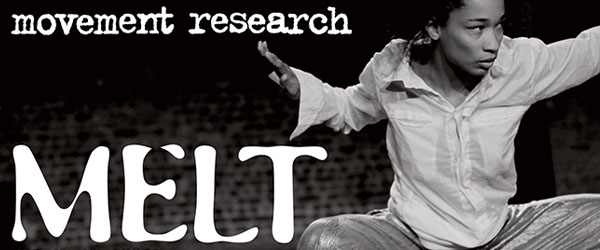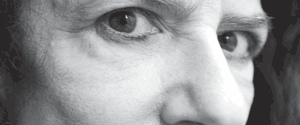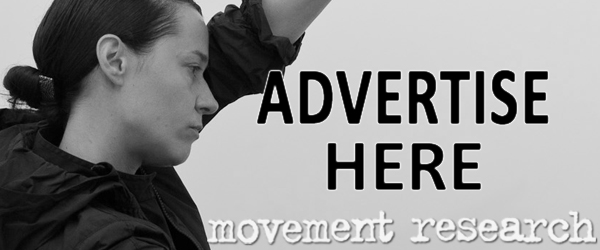Critical Correspondence
- Comments Off on Ralph Lemon in conversation with Donna Uchizono
- Conversations
- 10.19.10
Ralph Lemon in conversation with Donna Uchizono
Choreographers Ralph Lemon and Donna Uchizono discuss Ralph’s work How Can You Stay in the House All Day and Not Go Anywhere?, which recently had its New York premiere at the Brooklyn Academy of Music. CC has excerpted their discussion in four sections: Authorship; Nobility; Mentorship; and Grace, Generosity, and Love.
Interview date: September 30, 2010
Download this interview as PDF
Authorship
Ralph: In this work, I’ve been exploring the idea of authorship. [How Can You Stay in the House All Day and Not Go Anywhere?] has evolved in a way where it’s almost a collective, a faux collective. After Come Home, Charley Patton, I pulled more and more away from wanting to own what it was I thought I was making.
The last three minutes of Come Home, Charley Patton was an anti-dance that I didn’t want anything to do with, compositionally. I asked the dancers to throw themselves around wildly for as long as they could. It was fraught, because they needed my input, but ultimately they made it themselves. Part of this new work is the continuation of that so it’s gone from three minutes to twenty minutes. They’re still making it with my tricky input, my continuing and personal revolt against the accomplishment of many years of building a craft. I mostly feel like it’s not my dance.
There are five parts to this work, and there’s a different, questionable ownership to each part. It’s a little passive aggressive, and I’m happy that these questions of ownerships are happening, but I don’t feel like I wrote down on a piece of paper, “I want a more democratic way of working.” There is a part of me that would love to just have work appear alchemically, appear via some other kind of energetic exchange.
Donna: But then does it get billed as “Ralph Lemon?” There is that hidden responsibility dancers have to contribute a lot of material, structure, concept, and ideas. That’s a lot of responsibility that doesn’t get recognized. Within the community, people recognize that. But on a larger level, who gets the review, who gets the grant, who gets the support, who gets the next gig . . . that kind of recognition stops at a certain level. It’s a tricky place.
Ralph: I don’t really desire a collective. Although, I imagine something like what I have now continuing and being really interesting. This particular situation feels indeterminate and enlightened. Yes, it’s being supported because of my name, but inside of it, it has a holistic ecology [that depends on] every single collaborator. I try to be very clear about that.
This work would not have gotten supported if it were a pure collective. It’s bothersome, but it’s also the reality. I live with that. I think we’re all pleased with what the situation is. The external stuff—where the money comes from, what the title is, etc.—that’s not so interesting. It’s just the work we’re concerned with, and in the work there is no fraught, overwhelming hierarchy.
Nobility
Donna: The word “nobility” comes up in a lot of our conversations, that there’s something noble about the act of making dances and performing dances. How do you react to that idea?
Ralph: There are words that scratch the surface or are right at the edge of that portal, but it’s not quite [the word “noble”]. There’s something really beautiful about the work part. I don’t know about you but for me, it was there in the beginning and then it got a little confused in the middle. The long middle part where it became about support and dance company versus not a dance company, reviews, touring, a good work and a bad work.
The whole time I was just working. It’s just about the work. It’s just about getting up and having that work and having that work. There’s something very beautiful about that. That’s life.
And then there’s the placement of dance-making in our society—there’s so clearly no real payback other than the thing itself. I’m never confused about that. I don’t think I was ever confused about that part. You only get out of it what you put into it. Maybe I do romanticize the lovely impermanence of it. It’s there and it’s gone. At best, it’s just about cycling the gift of it. I guess that’s noble.
Donna: You’re talking about the courage it takes to continue to do this. It’s a practice. It almost feels like you have to have the courage to recommit to it everyday. It’s not the sort of thing that when you make something, you have some financial gain or presenters running after you saying, “I’m going to support you.” It’s this thing that you keep doing because you have to.
I’m just wondering if some people might look at you and say, “It’s easy for Ralph to say that because he has support.” A younger generation is coming up into one of the most difficult economic times that we’ve known. They’re still doing it and creating their own models. How does that [idea of courage] relate to [younger artists who don’t have support]?
Ralph: Support is relative. The few or many thousand dollars I get to make a work is more about the gift I’m getting from the people who care about the work and less about the dollars.  But compared to the larger world success order we live in, I’m in the margins. But yeah, I am supported. I have incredible people managing this research. To me, I’m supported by a handful of friends. It’s more about that exchange. That seems valuable and real. The other, it’s hard to articulate with any real meaning, because it’s so illusive and unpredictable. I don’t know what’s going to happen next year. And really, after I finish a work it’s like . . .
Donna: You don’t know.
Ralph: I don’t know. There’s no certainty. In that sense, I’m like everybody else.
Donna: Right.
Ralph: Maybe this is where I’m not like everybody else. I don’t really think about those things. I think about how can I be better at what I’m doing right now? Just within myself. Better at how I’m living, at what I’m doing, and at sharing [what I’m doing].
Mentorship
Donna: We spoke once about a conversation you had with a presenter about looking at work by younger choreographers. It’s interesting to see how this next generation and the generation after that creates its own craft or its own way to look at the work.
Ralph: I think that’s always been, right? Each generation is setting up their own criteria for how the work is perceived or how it should be perceived. How a particular generation empowers themselves as artists and as a community and dictates how the work needs to be or could be looked at.
Right now, the power is in the hands of the few funders and presenters out there. Some of them are really wonderful and working very hard, and some of them are rather lazy in how they think about moving the art form forward. So that’s that. That’s just nature. That’s the way it works.
At the end of the day, it’s the responsibility of the artist. It’s about a kind of emphatic-ness. What it is they’re making and doing and how they’re sharing that work and then being patient. It’s going to take people time, if ever, to give in. It’s a nice problem for both the inside and the outside.
I try to do my part by exercising my own generational purview, because I don’t know how to look at a lot of the younger work as well as it can be looked at. I’m trying. I find it very exciting and vital, but there’s a lot of information there that goes over my head or past my aesthetic and emotional needs. I think it’s an absolute responsibility for presenters, unless . . .
Well, this gets into a very difficult argument and discussion about what dance is and how to hold it. Like the idea of the canon. The canon is great but that’s all it is. It’s not like everything else should be held up to that, to exist or be relevant. It is just the canon. It has a place, and this young work has a place and there shouldn’t be a hierarchy.
Now where good versus bad work comes into play, that’s maybe where it becomes more simple. But what is that? What’s good work? I think there’s a lot of work to do, at least from the point of view of perceiving and responding to what we see, if we need to do that. Those in power positions of supporting dance need to do that. I think our being responsible in trying to understand what a work is trying to communicate, why it exists, is something that is only going to make the art form better. At the moment I don’t think that’s being done. We’re all too busy managing the outside surfaces of our own perceptions. And there’s a lot of work that’s really interesting and that’s just going to fall away or pass, unfortunately.
Donna: I always think about this, too. As you come in to the “downtown scene”, you’re forging this path, you’re not sure what it is, you have a community that you’re apart of. All of a sudden, you look back and you’re like “Oh my gosh! I’m actually now at the other side of it.” I don’t even know how I got here. I was just so involved in what I was doing. I always felt like I was emerging. I never felt like I had emerged, because it was always about exploring and getting better and charting new territories, or at least territories that were new to me. What is, then, my relationship to the dance community? What is my part in this now? How do I relate? Do I relate on any level to what is happening? How does that effect my work? Do you have a sense of that? Does that come into play at all? Do I isolate myself too much, or am I involved enough, or does it matter?
Ralph: I admire people like Ishmael Houston Jones, because he’s such a great artist mentor. The way he’s fixed in a community and how present he is. I really admire that. You do that as well.
Donna: I like to.
Ralph: You’ve really been giving a lot back. I’ve been more selfish maybe, or more spacey. I’m kind of more . . . what’s the word? Oblivious.
Donna: I don’t think you’re oblivious at all.
Ralph: I get so taken by some of the questions I’m asking. I go into my rabbit hole a lot and I come out and it’s like four years later or six years later [laughs] and I’m like “Who are these new people? Oh, I should go see this first. Who are they?” And they’ve been around for ten years. You’re right, I’ve been at this for 35 years now, and it feels like I moved to New York yesterday.
Donna: I know.
Ralph: I feel like a baby. I still feel really naïve. I feel like I still don’t know what I’m doing. The work still feels very fragile and fresh. Of course, life keeps on coming at me too, distracting me wildly. I don’t feel settled, but I know generationally I’m at a place that’s really different from where I was 30+ years ago. My placement’s quite different from a lot of the really interesting young work I’m seeing right now. But there’s also a part of me that is obsessed and in love with a certain privacy that seems to be really important to how I work and think about work. It seems necessary. That said, I think a lot about the idea of being a mentor, generosity, and giving something back. But when I think about the giving back, I’m not sure what that is.
Donna: Right.
Ralph: I’ve been working at something accumulatively that never seems to have anything to hold onto.
Donna: But you do give back, Ralph. Your presence has always been there for many. You also advocate behind doors. I, too, always question what is my relationship to this community? Does my work even have value in terms of what I hope I’m trying to do? I’m always trying to chart a territory that I haven’t been in. How do I make work, and how does it relate on a larger context?
Ralph: Yeah and history is so relative, too. There’s short history, there’s long history. There’s a history we don’t know. There’s a history of us after we’re gone. Over the span of our lives in New York, we’ve seen a lot of really hot artists come and go, right? Famous for a couple years and then . . . right? It’s very clear to me. It’s like that part doesn’t really mean anything. So again, getting back to this idea of being present and how to stay as present as I can. That’s become really clear to me, and that’s the best I can do.
Â
Grace, Generosity, and Love
Donna: You said that you were in love with the questions you were asking. Can you verbalize what those questions are, or are they energetic?
Ralph: I just had this recorded talk with PhillIp [Bither] at The Walker. He asked if I was I embarrassed by using terms like “grace,” “generosity,” and “love?” These are words I’m using to describe this new work. He suspects we live in a time (and have for a while), when artists don’t touch those terms. I said, “Yeah, I’m proud [laughs] that I can throw them around so freely.” I believe very strongly that they are really good markers for me and how I’m thinking of myself as an artist and human being. They feel complete. After love, generosity, and grace, what else is there? If I can make work that tries to hold those things, that’s good work.
I’ve made work about all the other stuff—being abstract, being nebulous, being indeterminate, making work about nothing. I’ve been in love with all those things at different points in my career. Now, these [generosity, love, grace] are the things I’m really interested in, how a particular art can hold them. That’s where it gets fun, because there’s a certain important element in art making that’s about being transgressive. And of course there’s something inherently contradictory about how art needs to not love. Love, generosity, and grace also holds all of this contradiction. These words hold everything. That’s what I’m discovering. There’s really no contradiction. There’s no problem. I can have it all. So, I’m not embarrassed.
Donna: I wouldn’t be embarrassed by it. I always used to say that kindness is so underrated. It’s such a needed and necessary thing. When people are [kind], it seemingly goes unnoticed but it does something energetically to the people who are involved. It’s subtle.
Ralph: I think it’s how we allow ourselves to illuminate all that is there. This idea of rage, anger, cynicism in a lot of work is due to the fact that there’s such an element of struggle in what it is that we do. But those things are not what they are without their opposite. Rage and love coexist. Rage is rage because of love, and love is love because of rage.
Donna: Love is such a huge container and can actually contain hate and rage. When you boil all of that down and you get to the essence of rage, anger, or hate, there is that love underneath. It’s hard when you’re in the middle of that struggle. When I was younger [it was difficult] to understand that there was a container that contained it all. It didn’t mean that those other things didn’t exist or that they didn’t have a certain pain. It was not to diminish or denigrate the kind of pain that can go with some of those things. Love seems to contain that too, or at least cradle it.
Ralph: When we use terms like this, where we try to mark a certain layered, varied emotionality, we create stagnation. When you’re talking about that whole complex mind-body continuum, it’s not fixed like that. It’s so much richer than a thing. When we think we’re feeling one thing, we’re feeling many things. What might the practice of that be to really allow it to open up and let that help us make work?
Donna: . . . which you do pretty brilliantly. [That] seems like it’s been your practice as a person, too. It doesn’t seem very different from the person I know who’s been practicing being a human being in integrity as much as possible in all moments. Also being very generous with the flaws we find in ourselves in that pursuit or practice. That has always been my experience with you as a person. [You are] someone who has a lot of compassion for the condition of being human and the flawed beauty of it. I see how that also informs the way you make work.




